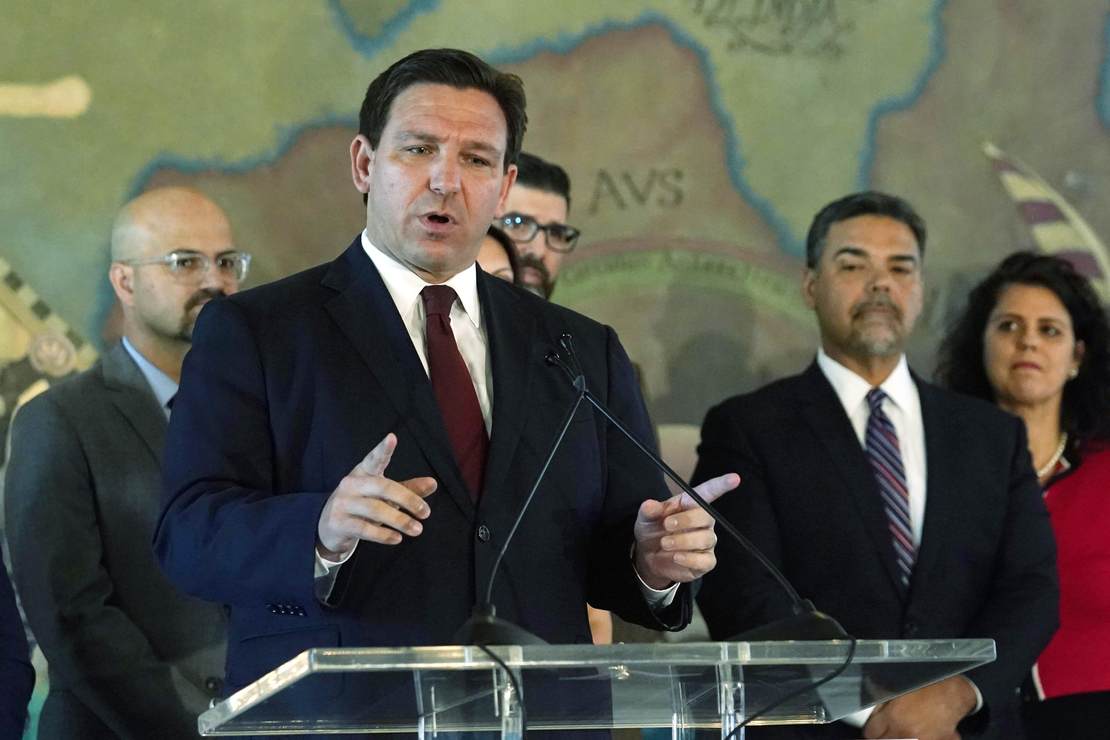
Maybe not. As practically everyone agrees, this is a good veto on the fiscal merits. Let the Rays pay for their own damned facility!
But OutKick claims there’s more to it than meets the eye, which is plausible. The Disney fiasco proves that DeSantis isn’t above misusing state power to punish a political opponent for disagreeing with him.
Florida Governor Ron DeSantis plans to veto a $35 million legislation for a Pasco County facility that’s earmarked for the Tampa Bay Rays’ spring training, OutKick has learned.
DeSantis’s decision is in response to the Rays politicizing recent shootings in Buffalo and Uvalde ahead of a matchup with the Yankees in May…
DeSantis is giving a voice to the people who do not want their sports and children’s companies on the front lines of the cultural divide.
No, that’s not what DeSantis is doing. (Again, assuming OutKick’s report is even true.) If the goal was to keep private companies from taking divisive political positions, he’d also be taking action against business owners in Florida who have spoken up in support of conservative causes. That would still be a terrible policy — businesses have a right to take political stances without fear of retaliation by the state — but at least it would be formally “neutral.” If you run a company in Florida, stay out of politics.
Until he punishes a right-wing business owner for activism, he’s practicing viewpoint discrimination against the left. And he’ll pay no price for it: It’s A-OK by the post-liberal populist right, which relishes seeing state power brought to bear on its ideological enemies, and will be grudgingly tolerated by the conservative intellectual class, which has adopted DeSantis as the Great Post-Trump Hope and will quietly indulge his abuses of power accordingly.
Here’s the tweet that allegedly offended him. It’s of a piece with Disney’s opposition to the “don’t say gay” bill inasmuch as the criticism offered by both businesses was mild to the point of being anodyne. The Rays’ tweet doesn’t even specifically call for new gun measures.
— Tampa Bay Rays (@RaysBaseball) May 26, 2022
Is that what led him to slash a $35 million facility from the state budget or was it the fiscal pain involved? He and his team haven’t denied the OutKick report. On the contrary, per Mediaite, his press secretary retweeted this tweet praising the OutKick story:
.@GovRonDeSantis is the most dynamic conservative elected official in America—the one who most clearly “gets” our current moment—and it is not a particularly close call. https://t.co/Evv34TXAYM
READ RELATED: Adidas supports transgender women competing against biological women in sports
— Josh Hammer (@josh_hammer) June 2, 2022
One potential difference between this episode and the Disney episode is that voters strongly support the “don’t say gay” bill that Disney criticized. That doesn’t justify using state power to punish the company for disagreeing but it does let DeSantis say that he used public power in defense of a position broadly supported by the public. Is that true with gun control, though? Florida is a right-leaning state but it’s also the site of the Parkland and Pulse massacres. It’s the only red state in America with a red-flag law, signed into law by Republican Rick Scott. Both of its current senators, Scott and Marco Rubio, have backed federal legislation that would offer grants to other states to encourage them to adopt their own red-flag laws. I can’t find any recent polls of the Florida on gun control but they’re clearly not the wild west on the subject. Even some GOP officials there are willing to compromise.
So is it even true in this case that most of the public sides with DeSantis on the underlying issue?
Kim Lane Scheppele is a sociology professor who spent years working for Hungary’s Constitutional Court. Hungary’s leader, Viktor Orban, is in vogue among the post-liberal right; the latest CPAC conference was held in Budapest as a sort of tribute to him. Scheppele’s been watching how Trump and DeSantis operate politically and recognizes an ethic of retribution similar to what she observed from Orban:
In Hungary under Mr. Orban, political payback is common. Mr. Orban first targeted the independent and opposition media by directing state-funded advertising to pro-government outlets. He has used state regulatory power to shift business from unfriendly hands to friendly ones, starting with a law that required tobacco sellers to be licensed by the state. (Many of those licenses were awarded to government supporters.) With tobacco as a model, Mr. Orban opened similar efforts in the banking, energy and telecom sectors. Owners whose businesses failed to support the governing party have been sidelined, while party loyalists gained. When discontent with Mr. Orban overflowed and his party lost many of the country’s big cities in the 2019 local elections, he cut major sources of revenue for opposition cities so that their mayors would appear incompetent without resources…
Retribution is the method of the bully. By punishing opponents for minor or even imagined infractions, all but the bravest opponents slink away. And it generates compliance. That’s precisely why it is a useful tactic. Only a few need to be targeted for many to toe the party line. Payback also generates loyalty. Friends stay close when they benefit from government largess.
American politicians face more institutional checks than Orban, which Scheppele acknowledges. But a public with an appetite for retribution is the first necessary ingredient to getting rid of them.
Here’s DeSantis being asked about his veto today and citing both theories to defend it. It’s inappropriate to use tax dollars for professional sports stadiums, he says, which is completely defensible. It’s also inappropriate to use tax dollars to subsidize political activism by private corporations, he adds, a hint that OutKick’s report was correct. But Florida surely subsidizes many companies that “engage in political activism” in the form of donations to politicians; Disney has given thousands to DeSantis himself in the past, in fact. And, again, if this is a truly neutral policy aimed at keeping corporations out of politics then we should expect him to eventually punish an outspoken right-wing business as well. Does literally anyone think he will?
“It’s inappropriate to … subsidize political activism of a private corporation.”
— Gov. Ron DeSantis (R-FL) defends vetoing funds for a Tampa Bay Rays practice facility after the team tweeted about gun control pic.twitter.com/8owFo7G1A8
— The Recount (@therecount) June 3, 2022
Source:





